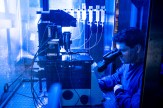New professor studies energy in the emerging interdisciplinary field of sustainability science

Jennie Stephens says it’s clear that the world is transitioning away from fossil fuels toward renewable-based systems for the majority of our energy needs. How long will this transition take? No one knows, but in the U.S., renewable energy power capacity is growing much faster than forecasts in years past have predicted.
Stephens, who joined the Northeastern faculty this fall, says much attention on the “renewable energy transition” has focused on technological innovation. Her research, by contrast, focuses on social, cultural, and institutional innovations facilitating social learning within this transition. That is, she focuses on understanding how the social dynamics—including political power, institutional norms, and gender— influence deployment of wind power, solar, and smart grids.
Northeastern, with its emphasis on use-inspired research across disciplines to solve global challenges, provides an optimal environment for Stephens to pursue this line of work. In particular, she says, the university’s commitment to sustainability as a core value and research thrust will buttress her ability to build new collaborations in her emerging interdisciplinary field of sustainability science.
Coming to a university with a commitment to cross-disciplinary research with high impact that is being very dynamic and responsive to what’s happening outside the university is just very exciting.
— Jennie Stephens, Dean’s Professor of Sustainability Science and Policy in the School of Public Policy and Urban Affairs
“Sustainability science is defined by the problems it addresses, rather than the disciplines and methods used to address those problems,” explains Stephens, Dean’s Professor of Sustainability Science and Policy in Northeastern’s School of Public Policy and Urban Affairs. “It has this science-to-action connection that is very explicit. Coming to a university with a commitment to cross-disciplinary research with high impact that is being very dynamic and responsive to what’s happening outside the university is just very exciting.”
Stephens—who left an endowed professorship at the University of Vermont to come to Northeastern—co-authored a 2015 book published by Cambridge University Press, Smart Grid (R)Evolution: Electric Power Struggles. This book explores changes occurring within the electricity sector, how to promote reliable renewable energy, and engages the public in the conversation during this time of rapid technological, social, and environmental change.
She holds a doctorate in environmental science and engineering from the California Institute of Technology and a bachelor’s degree in environmental science and public policy from Harvard University.
One of her primary areas of focus right now is examining the renewable energy transition as it relates to policy—particularly, the tension between policy-driven large-scale rapid deployment of renewable energy systems such as large wind farms and utility-scale solar systems, and how smaller-scale renewable deployment at the community and household levels can lead to multiple additional societal benefits. Stephens is studying how electric utilities are responding to the renewable energy transition and to what degree, if at all, they are reconsidering their business models and encouraging customers to move to renewables.
At Northeastern, Stephens is also eager to integrate experiential components into her teaching, particularly at the graduate level. She has previously taught service-learning courses, which integrate semesterlong team projects with community partners with instruction and reflection which, she says, lead to rich, engaged learning for students. She is currently developing a course, “Renewable Energy Transitions: Technology, Policy, and Social Change,” with a service-learning component for the spring semester.
Stephens also studies diversity in the energy sector—both in terms of the range of new jobs that will come with the renewable energy transition and the workforce of people that will fill those jobs. “There are all kinds of jobs in the energy sector that aren’t necessarily engineering,” she says. “Workforce development for the renewable energy future hasn’t yet gotten enough attention. There are opportunities with this energy transition to really diversify who is benefitting and who has jobs in energy.”
Preparing the next-generation for energy jobs of the future, she says, must begin at the K-12 level. One thrust of her current research involves studying how to integrate climate change and energy into environmental education, which has traditionally focused on ecology and natural systems.
“Expanding climate and energy education and preparing for the renewable energy transition is critically important to building resilience,” she said. “We need to prepare students with skills to engage in a rapidly-changing world.”





